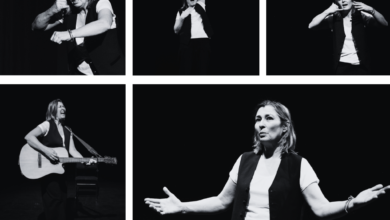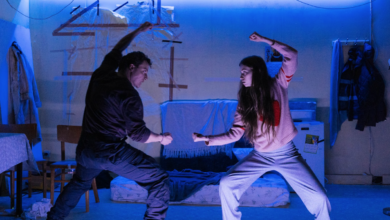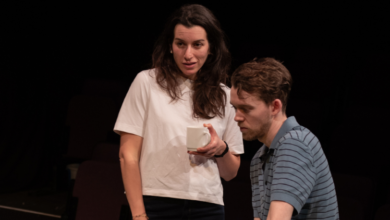Review: Karen, Underbelly Boulevard
Cathartic potential is clear, but emotional connection is missing.Rating
Good
Karenis a new one-woman show by Sarah Cameron-West that follows in the tradition of Phoebe Waller-Bridge and Miranda Hart: a protagonist, written and performed by Cameron-West herself, conjures an entire world as she attempts to navigate troubled relationships and the social demands of office life. The unnamed protagonist has broken up with by her boyfriend, Joe, at Alton Towers on her 30th birthday, halfway through eating a Calippo. To make matters worse, he leaves her for another woman, Karen — a colleague who also works with the ex-couple.
Cameron-West’s performance style is distinctive: she never directly addresses the audience, instead speaking to invisible characters who are realised through her monologues. She does a commendable job bringing these characters to life, and despite frequent shifts in perspective, the plot never becomes confusing. Moments when she interacts with audience members by pretending they are other characters are particularly enjoyable. The writing is clever in this regard, allowing the audience to visualise every character clearly. The production also makes excellent use of lighting to heighten the comedy. A red wash, for instance, represents her raging mind when she speaks to Karen, in contrast to what she actually says in normal lighting.
It is clearly a well-crafted script, and there are jokes throughout, but the piece suffers from a few problems in its central characterisation. Cameron-West’s performance is energetic and expressive, but it remains fixed on a single emotional note: anger. She erupts into furious outbursts almost immediately and rarely steps away from them, leaving little space for the audience to see the woman behind all the shouting and crying. While the show embraces female rage and challenges the idea that women should express their anger in a palatable way, it does so in a manner that feels one-dimensional and ultimately exhausting. She touches on themes such as jealousy, disappointment, and feelings of inadequacy, but never explores them deeply enough to draw meaningful conclusions, leaving the story feeling somewhat thin.
One of the few reflective moments comes when she considers how her parents’ successful relationship has affected her, suggesting both that she should be able to find love because she knows what it looks like, and that her father has set an impossible standard for the men in her life. Yet this reflection feels misplaced in a story about losing someone she loved rather than struggling to find connection. This all matters because it prevents her from becoming a sympathetic character, which is vital if the audience is to be on her side through her misfortune.
The ending, in which the protagonist explodes during a meeting with her boss, yet is rewarded with a transfer to the company’s New York office, feels more obscure than optimistic. She faces no real consequences for her erratic behaviour in the meeting and we don’t get the satisfaction of seeing her work through her emotions and come out the other side. A new beginning appears to fall into her lap rather than being something she earns.
The scaffolding is in place for Karen to be a great show: the relationships, staging, and humour are all there, but the situations and themes would benefit from deeper exploration, and the piece as a whole from greater emotional variation. There is the potential for Karen to offer real catharsis to anyone who has felt wronged and compelled to suppress their emotions, but for that to resonate, the audience needs to feel a stronger connection to the protagonist.
Written by Sarah Cameron-West
Directed by Evie Ayres-Townshend
Produced by Sarah Cameron-West
Lighting by Oliver McNally
Sound by Sarah Spencer
Karen has completed its current run.






